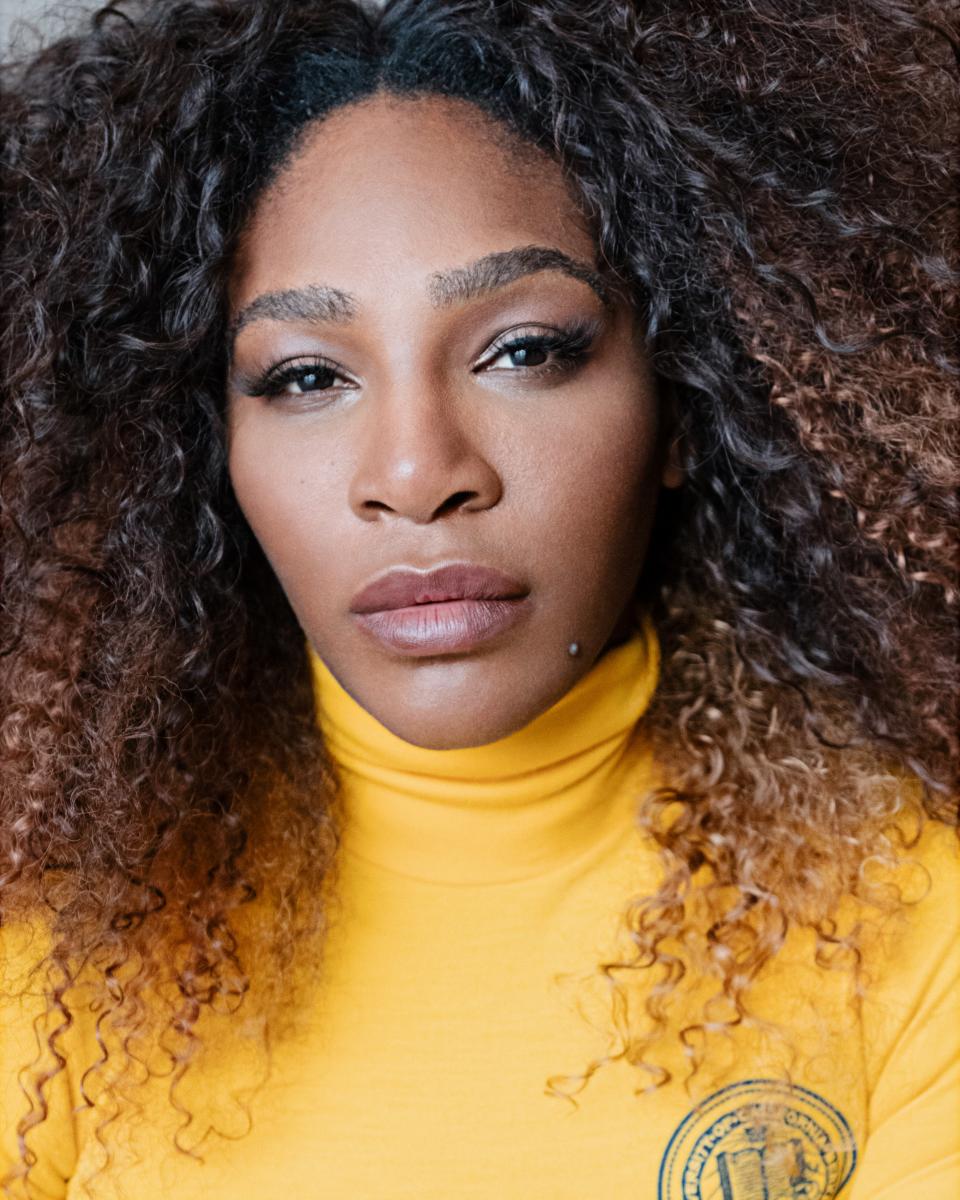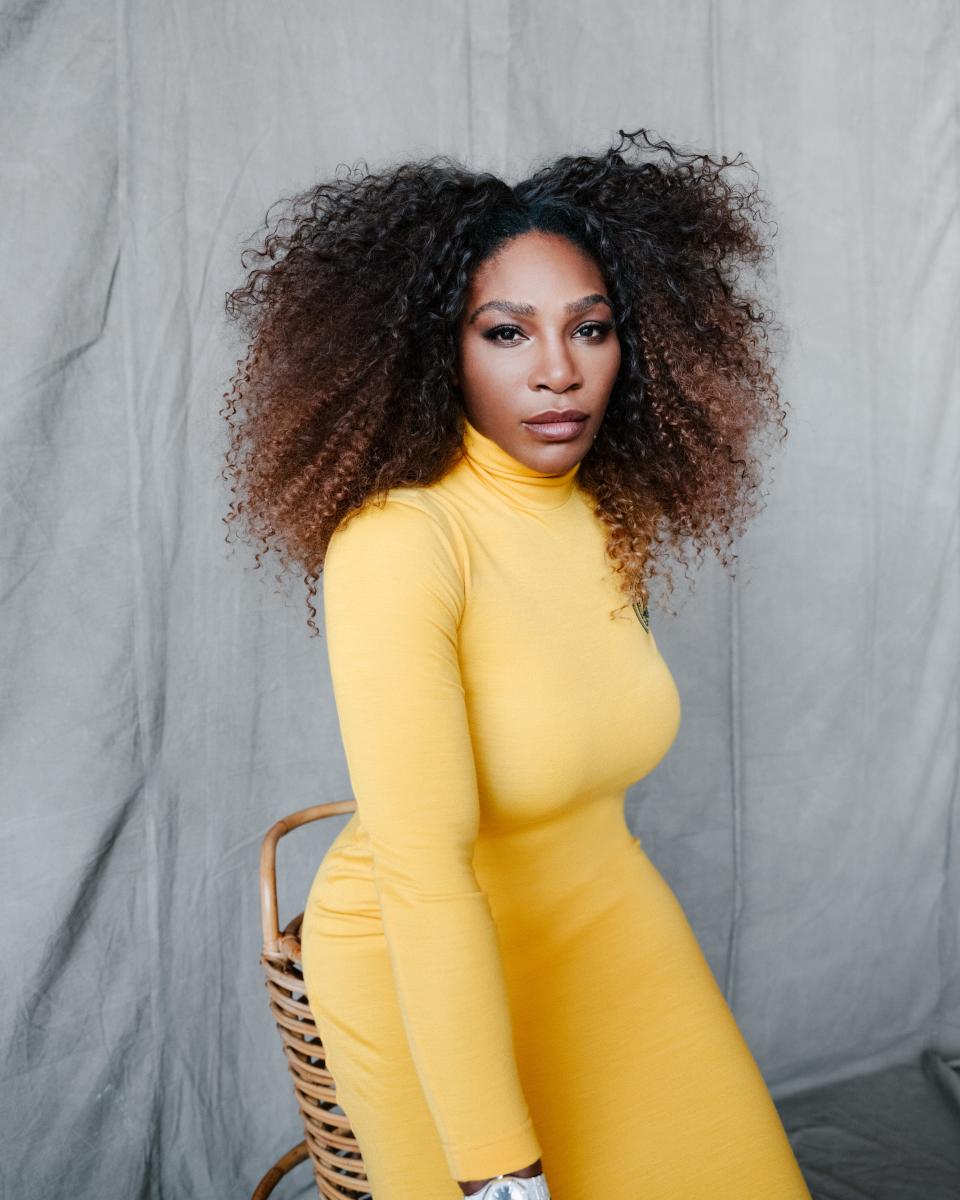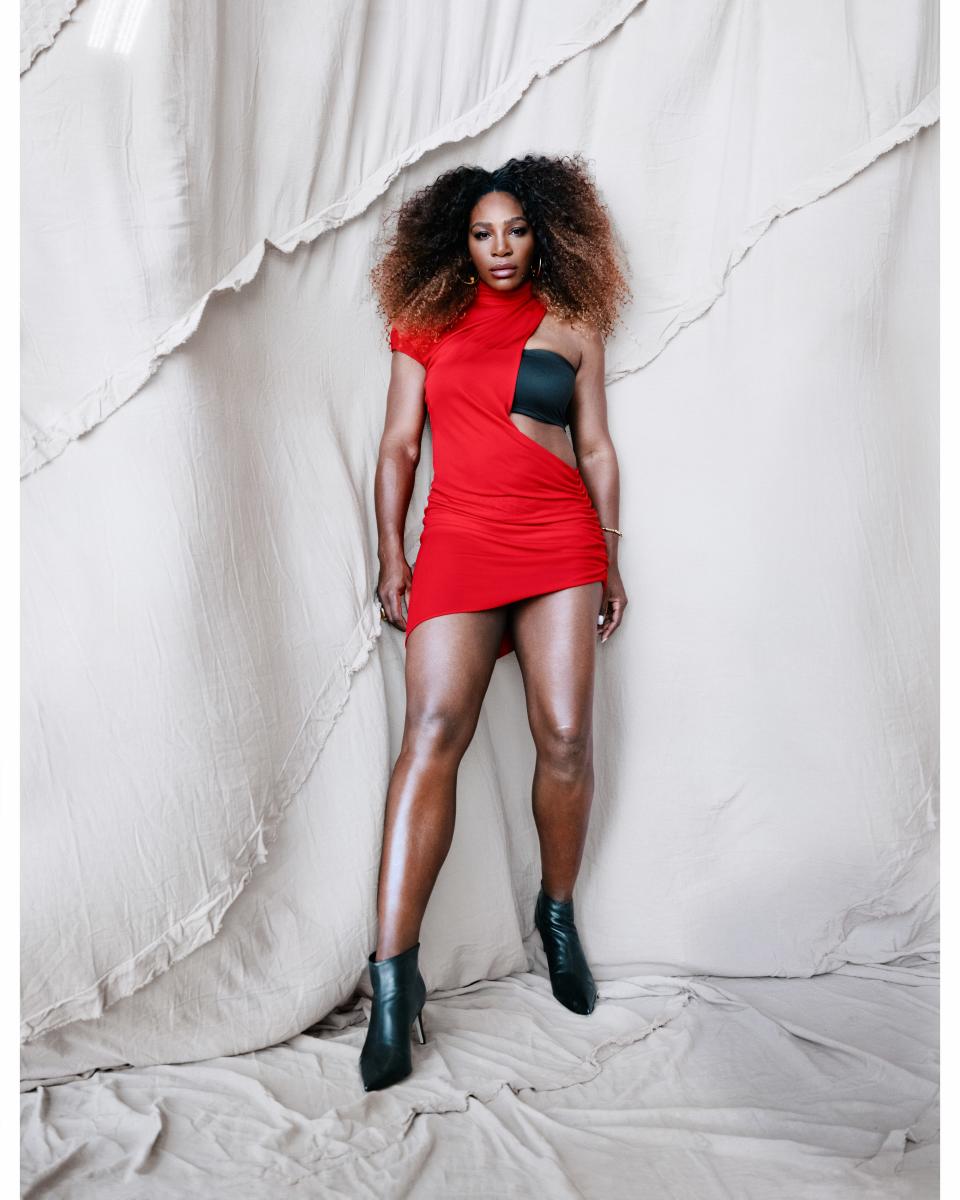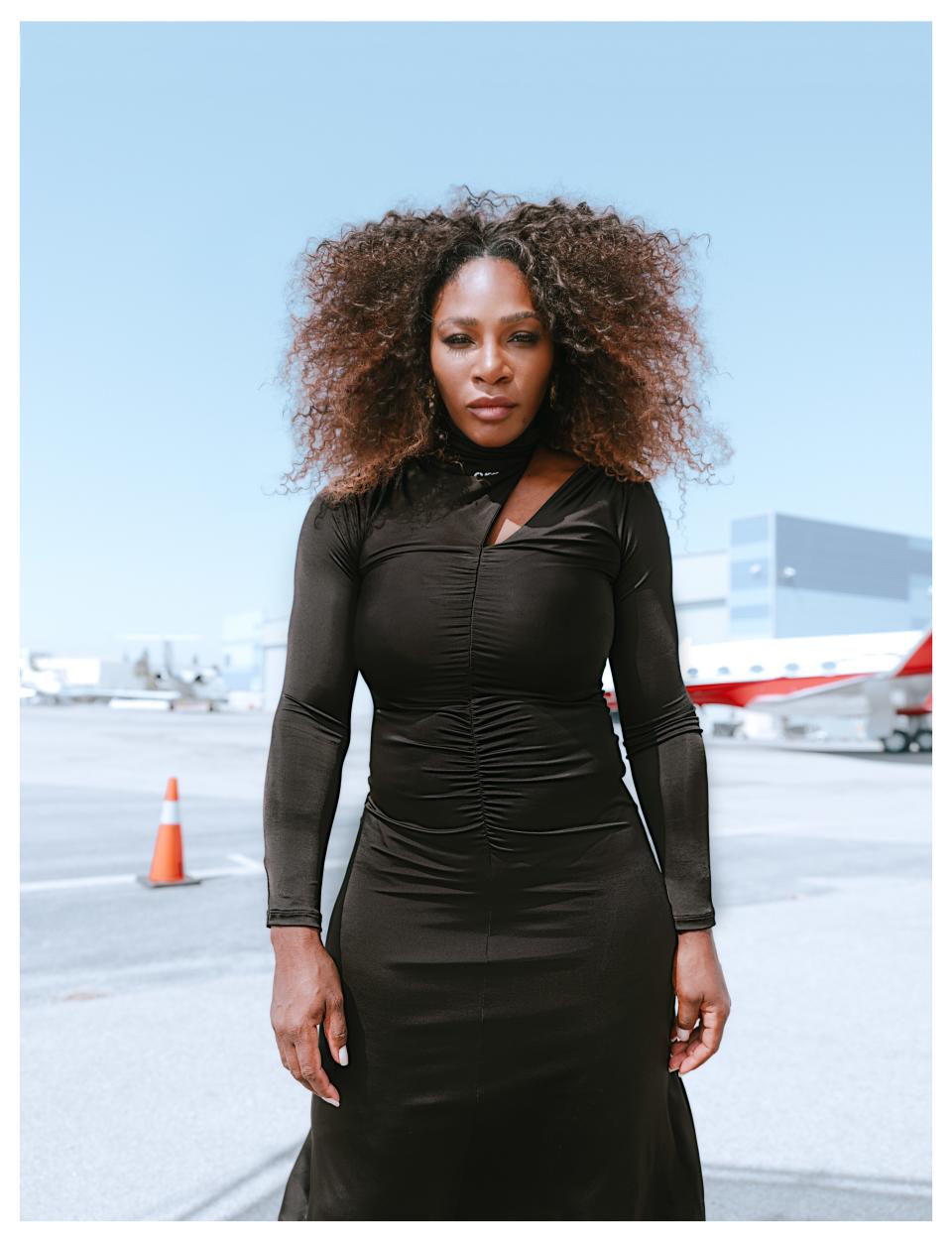Serena Williams Is the Champion of the Year
She has appeared, quietly and without fanfare, on the backyard patio of her Palm Beach Gardens, Florida, home, where I have been waiting with Chip, her tiny 5-year-old Yorkie. She slides her fantastic, superhuman body onto the white couch without so much as a sigh. It's oddly spectacular. "I'm struggling a little bit," she says, apologizing for being late. (She hardly is.) "It's a baby. You're never on time with a baby." She says she didn't get much sleep. She's in a pink top from her new independent clothing line, Serena, and she's wearing gray sweats, no shoes. Really, the only remarkable thing is her makeup, fresh and glistening, full-on contoured cheeks, shiny lips, woolly lashes, eyebrows enhanced with confidence and certitude. It strikes me as the kind of effort you'd put into a photo shoot, or a press conference. She said she would do this thing, so she's going to do it. It's part of the job. A professional athlete today is supposed to provide thoughts after the big game, help make sense of the whole thing, put it all in cultural context—and let's face it, that last one was loaded.
The 2018 U.S. Open at Arthur Ashe Stadium in Queens, New York, all the world watching Serena Williams, the most enduring athlete of all time, perform, impossibly, in top form, still, at age 36, and just a year after having a baby, after battling life-threatening blood clots, after marrying a tech giant, Alexis Ohanian (co-founder of Reddit; she had no idea what Reddit was, he had never watched a tennis match), and then...what? What is happening to Serena? She's, well, pretty upset with chair umpire Carlos Ramos for giving her a "coaching" code violation, and, what? Of course she is, after all, losing. Defeated in the first set and trailing in the second—but she's arguing with Ramos, and, what? Now she's smashed her racket on the ground, reducing it to a wobble of gut and wire, and she's demanding an apology: There are men out here that do a lot worse, but because I'm a woman, because I'm a woman, you're going to take this away from me? She's pacing, calling Ramos a "liar" and a "thief" for removing the point, and so he docks her a whole game, and thus her opponent, 20-year-old Naomi Osaka, wins her first Grand Slam, in a way no one ever wants to win her first Grand Slam, the crowd booing the umpire, Naomi sobbing, apologizing for winning, Serena telling the crowd to stop it, to let Naomi have her moment, and then of course come the tweets, and the opinion pages, and a racist cartoon, everybody shouting. The noise. The noise. The noise. Yes, yes, yes, discuss! It's part of the job.
"I love your shoes," she says to me, looking down. "They're really stylish."
"Hey, baby," she says to Chip.
I tell her I'm sorry if I'm part of the problem. All the world tugging at her.
"No, no, no," she says. "God, no."
She strikes a remorseful tone when she attempts to explain why she got so upset at Arthur Ashe Stadium, says bad stuff always happens to her at the Open.
"I've had a lot of things happen to me at the U.S. Open," she says. "I think about three or four different things. Especially in the later rounds. I think a person can be a little bit more sensitive to anything in that moment. You know, it becomes a trigger moment. When you go through a really extreme ordeal not once, not twice, not three times, it becomes a trigger moment."
Too sensitive. A person making herself wrong for expressing outrage, using words like "trigger moment." Serena? What happened to There are men out here that do a lot worse, but because I'm a woman, because I'm a woman, you're going to take this away from me?
"I don't really remember how it went, to be honest," she says with a wave of her hand and a tug on the headband keeping her prodigious curls in order. "I've been purposely not thinking about it." She says she's deleted social-media apps from her phone. "I don't watch TV at all. I try to keep myself in a bubble as much as I can. I just don't want to be involved in other people's opinions. Let them live how they want to feel."
Chip hops onto her lap. "He won't even acknowledge the baby," she says. "He's having a hard time." I tell her I like Chip. He's calm. She looks up at me, for the first time that morning meeting my eyes. I wonder what it must be like to be Serena, all that might, all that emotion, all the symbolism and all the responsibility—an icon getting some distance on the world swirling around her.


Watch Now:
Serena Williams on How She Became Serena Williams
"I feel like we need to shift to that mind-set, you know, it's not just me, it's the way the country is," she says.
She would like to make one thing clear about Ramos hitting her with the coaching code violation. It wasn't typical. Usually, if an umpire notices a player's coach making suspicious movements (in tennis, coaches are not allowed to, well, coach during the match), he'll simply say something to the player and that's the end of it. "That was where a lot of people don't understand. That's where I was coming from. Like, usually you talk to me, tell me that something's happening, and I'll tell my box, like, whatever you're doing, don't. First, I can't see you—I'm clear on the other side of the court. Second, don't do it. We're here to win or to lose with dignity, and that's how I've always done my career." To be accused of cheating, and eventually docked a point for it, was an injustice. "That is not right," she told the referee repeatedly. "And you know it. And I know you can't admit it, but you know it. That's not right."
An injustice. What do you do with that? If you're a man, you fight and become a hero; if you're a woman, you better shut up or else they'll call you crazy.
I ask her what it's like to find herself at the center of a giant conversation, particularly now, in this #MeToo moment, about power and gender, about what happens to a woman when she expresses anger.
"Especially a black woman," she says. "You do research on how black women, you know, in the workforce are, there's literally papers about it, how black women are treated if they're angry, as opposed to white women, white men, black men. It is bottom of the bottom of the totem pole."
The controversy at the Open happened just as people were gathering in Washington to consider the nomination of Judge Brett Kavanaugh to the U.S. Supreme Court. These narratives inevitably became linked.
“Tennis players didn’t look like me. Especially the top players or anyone that ever won Grand Slams. Nothing like me.”
"Funny how a black female tennis player is held to a higher standard to keep her emotions in check than a Supreme Court nominee," tweeted Alabama state-senator candidate Deborah Barros, referring to Kavanaugh's tears and hissy fit upon being accused of sexual assault by Dr. Christine Blasey Ford. He was praised by President Trump for being a fighter, and then he was awarded a lifetime appointment to the nation's highest court.
"It's not funny; it's bullshit," Serena's husband, Alexis Ohanian, said in a follow-up tweet, and in a tweetstorm he railed on her behalf.
"Kavanaugh's a white man," Serena says, when I ask her about anger and who's allowed to express it. "I'm a black woman. His limit is higher. My limit is way lower. And that's where we stand right now in this world. And it's a fact. It is literally a fact. If you don't believe anything I say, just look at those two examples."
I ask her what she does with that. How does she accept that and walk around with it?
"You don't accept it. You talk out about it like I have. You make it better for the next generation." She talks about the continuum, about Rosa Parks, "or you look at people like Althea Gibson, who had to sleep in her car." In 1956, Althea Gibson became the first African-American to win a Grand Slam title, and the next year she won two more, despite the fact that hotels and country clubs still excluded blacks and so she was routinely banned from clubhouses. Also she was broke. There was no prize money for women in tennis, no professional tours.
"That was awful," Serena says. "But that was for her generation, and she bore the burden for someone like me. I have it way better than she does. And then I'm bearing the burden for the next generation, and they're going to have it way, way better than I do."

Serena's house is newly furnished with big, plastic toddler gear, a colorful slide, climbing things, toys everywhere; the dining-room table is covered with stuff, half-opened boxes, papers, a miscellaneous sorting place. Nothing about the house suggests world-famous, fantastically wealthy athlete; in fact, with the growl of the leaf blower and the static morning sunshine, the vibe here is just a regular Thursday where the dad is away on business (he is) and the mom is home thinking about playdates.
"Do you want to move over to the sandbox?" Serena asks, and that's what we do, following 1-year-old Olympia, who just woke up and is motoring around the patio, and everything now is baby talk—I've just never loved anyone like I loved this little baby, how'd I get so lucky to have this baby?
"We do everything together," she says excitedly. She tells me she has been with Olympia every day of her life so far: "I love everything about being a mom. The only thing I don't love about being a mom is come 7:30, Olympia's in bed and I get sad. I'm like, 'Should I go to bed?' Because then if I wake up, I get to see her again."
In the sandbox, Serena abruptly switches to French, as she often does with Olympia. She taught herself the language when she began setting up schools in Africa a decade ago, and she lived for a time in Paris, and of course her coach, Patrick Mouratoglou, is French. Olympia hasn't started speaking yet, but it's bound to come out French! "I'm keeping a lot of her clothes," Serena says. "And then, when she gets a little older, we're going to go over to the foster care and give them away." She says she is looking forward to many of the things they will do together as her daughter grows up.
No plans, per se, for tennis. Not like it was for Serena, growing up with her famous sister, Venus, just a year older, when life was: tennis. Their father, Richard, had no background in tennis, but when he saw that professional players could achieve tremendous success, he decided to make the sport central to the family's lifestyle. He bought books and tapes to learn tennis, taught his wife Oracene, a gifted athlete, how to play, and together they coached the three girls from his first marriage. He perfected the plan with baby Venus and baby Serena. They were 3 and 4 when they first hit the courts, in Compton, California. Their father drew up a 78-page training regime, a blueprint to tennis glory, and he even wove in lessons about dealing with racism.
And with that, Venus and Serena began to develop into fine tennis players. Their father moved the family to a compound in South Florida when Serena was 10 and Venus was 11, where they could attend the tennis academy of Rick Macci, but a few years later he pulled them out and did all the coaching himself at home. The only thing more outlandish than the plan was that it worked, spectacularly, and soon Venus and Serena were winning titles and trophies, and they became millionaires many times over, moving into separate wings of their own mansion together, here in this gated community in Palm Beach Gardens, just one street away from where we are now sitting.
I make the point that maybe it's not so hard for Serena to live in a bubble, as she has insisted she now wants to do, since she grew up in one. It must feel familiar, and safe, to be in a bubble. She looks at me, confused. What do I mean?
"So much tennis," I say.
"I don't feel like I was really in a bubble, to be honest," she says. "I had friends. And you know, my dad wouldn't let us be pro full-time until we finished high school."
It was a normal, happy childhood, she says. Besides, it wasn't just tennis. "Our dad said always put God first and then family and then tennis," she says. They were devout Jehovah's Witnesses. "And I remember being so young and not understanding, because I was like, 'We want to do tennis first.' He's like, 'No, God always comes first, followed by your family. And then after that it's tennis.' I thought that was interesting. I never forgot that. I kind of always lived by that. And I think that's what made me and my sister such rounded people."
It certainly seems that the message stuck. The family remains a tight-knit unit. Serena is nothing but all defense when it comes to her family, showing not so much as a nod toward the notion that her dad is one eccentric man. He still lives close by, is long divorced from her mom. Last November, he texted Serena one hour before her wedding to say he was not going to walk her down the aisle. He was sorry. He was not up to it. She understood.
Oracene, Serena's mom, just moved into the neighborhood, and Venus lives one street away in the mansion the two sisters used to share. "I moved out, like, three years ago. I was like, 'Venus, I'm never going to have a serious relationship if we're roommates forever.' It was hard for me the first six months. I still stayed in our house. It was like, 'This is my bed!' But then, slowly, it got easier. Now she's always over here. She doesn't keep anything in her house, so she always comes over here and gets food.
"It's honestly pathetic, but we're really close."
So close that for a long time when they were growing up, Serena couldn't find where Venus left off and Serena began. Just 15 months apart in age, both athletes, prodigies, in the exact same sport on the exact same court.
"I was not myself. I was Venus. Just…Seren-us. I identified as Venus. I felt weird, like, my boobs were bigger than Venus's, and my body was thicker. I was curvier. I was like, 'Why am I not Venus?' And she was tired of me copying her. She was like, 'Get your own identity, please!' It was like a window into much bigger things that I would face in the future. I was different. I looked different. And I played different. And I hit different. And I ran different." She credits her eldest half sister, Yetunde, who was once personal assistant to both Serena and Venus, as the one who helped her overcome her feelings of inadequacy. "I was really struggling, and she's like, 'You know, everyone is different. You're not Venus, and you're never going to be Venus. You're never going to be as thin as her, and that's okay. And you're never going to be as tall as her, and that's okay. Nothing is wrong with that. You have a beautiful body on your own. You have a beautiful face.' And that's when I first started being more comfortable with who I was." Years later, in 2003, Yetunde was killed in a gang-related drive-by shooting in Compton, and when Serena says the loss hit her hard, was in fact devastating, this is part of what she means.
"But it was good that she taught me that lesson, because in a way she was teaching me a lesson about life. In a way, it had nothing to do with Venus. It wasn't about her at all. Tennis players in general didn't look like me. Especially the top players or anyone that ever won Grand Slams. Nothing like me. So it was, Can I win looking like this? Can I perform looking like this?
"And that was something that I realized that I could do. I just had to learn that it was okay to, you know, not be Venus."
She was 16 when the differentiation happened. She remembers vividly because a year later she won her first Grand Slam title, at the 1999 U.S. Open, defeating world number one Martina Hingis. Then the more she allowed herself to become Serena, the more she won: 23 Grand Slams and four Olympic gold medals and more than $88 million in prize money over the course of her career. She embraced different, became its defender, spoke out for the disenfranchised, railed against pay gaps for women of color, against police violence, LGBTQ discrimination. Even the very fact of her race seemed like its own act of defiance in an ultra-white sport; she trotted out different as a fashion statement on the court. In 2002, a black Lycra mini catsuit at the U.S. Open; in 2004, denim and knee-high boots; in 2008, a white trench coat at Wimbledon. Let them criticize. Give them something to talk about. Be different.
“Everyone has to work on something. I’m still learning to embrace being, for lack of a better word, great.”
So there she was: In May 2018 at the French Open, making her Grand Slam return after giving birth to Olympia, and for that occasion she wore a skintight catsuit. "I feel like a warrior in it, a warrior princess," she said during a press conference. "I've always wanted to be a superhero." But it wasn't just about her. The look was a gift to moms everywhere, embracing femininity and all its glorious curves. "Catsuit anyone?" she tweeted with a picture of herself. "For all the moms out there who had a tough recovery from pregnancy—here you go. If I can do it, so can you. Love you all!!"
The French Tennis Federation was not impressed. Officials later responded by banning catsuits: "One must respect the game and the place."
So then, finally, two weeks later, the big emotional finale at the 2018 U.S. Open at Arthur Ashe Stadium. Here comes Serena, locked and loaded in a fuck-you tutu. A two-tone one-sleeve leotard with twirl-worthy black tulle peeking out and fishnet tights, the ensemble a collaboration between designer Virgil Abloh and Nike. On Serena it was fabulous, and righteous—the world's greatest athlete in a tutu coming after some stupid skinny white-boy umpire who robbed Serena, who robbed Naomi of legitimate glory, who ruined everything.

I ask Serena how it feels to accomplish so much in her life, all the progress for women in sports and fashion and business, all the trophies, all the millions of dollars.
"It feels good," she says. "I mean, I go out there, and I win, and it feels good." She takes a sip from her glass of water, jiggles the ice. There is clearly more to this story. We have moved back to the couch because Olympia is busy inside at her high chair, experimenting with solid foods, dropping them overboard for Chip—tender offerings of friendship.
"But I also, unfortunately, you know, I'm always thinking, Okay, so what's next? What can I do? How can I improve? You know, What did I do wrong? It's just a vicious cycle. It doesn't matter if I win a Grand Slam, I'm always thinking about Okay, I won—now what's next?
She has said in the past that her ultimate goal is 25 Grand Slam victories, to surpass the record of Australia's legendary Margaret Court, who holds 24 (Serena has 23), but she doesn't talk that way today on the patio. "I think my goal is when I wake up and I say I absolutely don't want to do this anymore, and that will be when I decide it's enough." She'll start training again in a few weeks for next season. "It starts slow. It starts just, like, a mile running and then, like, 45 minutes on the court. Until then I'm up to, like, three miles a day. Or every other day, and two and a half hours on the court—twice a day."
So that's, you know, tennis. She becomes animated when she starts talking about the fashion line, hiring execs, interviewing, all the business stuff she's learning: "I never thought I would have a start-up. And it's been so much work, and it's so chaotic, and I've never been more stressed out in my life. Just like, literally, meetings after meetings and call after call. But at the same time, it's like I'm stressed out, but my hair isn't falling out. Because I'm having fun. I'm doing everything, I'm doing the designing, I'm leading the calls, I'm doing the COO search. So I'm literally on the phone every night until, like, 10 p.m.
"And I'm a full-time mom. I'm a very hands-on mom." She's a sandbox-and-teach-your-kid-to-be-bilingual mom. In an offhand way, she says she's thinking of one day adopting a kid from foster care, too.
So, sure: 25 Grand Slam victories, becoming the undisputed best tennis player of all time. That would be nice. But then what of 26? Where does it end? Motherhood and marriage and a new business and a certain philosophical distance seem to have widened her measure of success.
"A good friend of mine, Sheryl Sandberg, we're really close," she says. (Serena famously became a rock for Sandberg, chief operating officer of Facebook, when she was grieving the sudden death of her husband in 2015.) "When I won my last Grand Slam, she's like, Serena. I think it was Wimbledon, a couple years ago. She's like, 'You've got to celebrate this.' I'm like, 'I know,' and she's like, 'No, you need to celebrate and enjoy this moment,' and I'm like, 'All right...'
"That is something that I need to personally work on." She pushes her sleeve up, rubs her shoulder. "Everyone has to work on something," she says. "I'm still learning to embrace being, for lack of a better word, great."
She sits with that one for a moment. Huh. What a weird thought. A person struggling to learn that it's okay to be amazing.
"I did buy myself a cake the other day," she says. "I never have cake. I went to bed thinking I want a cake, and I want, like, a decorated cake." She pulls out her phone, swipes, finds the picture, and shows it to me—a mini cake, single serving, white icing, abundant yellow flowers, flowing ribbons of purple sugar. "Maybe it was my celebration to myself?" She pinches the photo to make it bigger, leans in. "I felt really happy to have that cake and eat it."
Jeanne Marie Laskas is a GQ correspondent.
A version of this story originally appeared in the December 2018/January 2019 issue with the title "Serena Won!"






